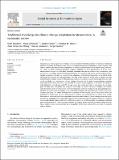Files in this item
Traditional knowledge for climate change adaptation in Mesoamerica : a systematic review
Item metadata
| dc.contributor.author | Mardero, S. | |
| dc.contributor.author | Schmook, B. | |
| dc.contributor.author | Calmé, S. | |
| dc.contributor.author | White, R.M. | |
| dc.contributor.author | Joo Chang, J.C. | |
| dc.contributor.author | Casanova, G. | |
| dc.contributor.author | Castelar, J. | |
| dc.date.accessioned | 2023-04-20T16:30:09Z | |
| dc.date.available | 2023-04-20T16:30:09Z | |
| dc.date.issued | 2023-03-21 | |
| dc.identifier | 284333300 | |
| dc.identifier | 2b9ce82d-0041-40cf-93c9-8b9e2fe94919 | |
| dc.identifier | 85151873346 | |
| dc.identifier.citation | Mardero , S , Schmook , B , Calmé , S , White , R M , Joo Chang , J C , Casanova , G & Castelar , J 2023 , ' Traditional knowledge for climate change adaptation in Mesoamerica : a systematic review ' , Social Sciences and Humanities Open , vol. 7 , no. 1 , 100473 . https://doi.org/10.1016/j.ssaho.2023.100473 | en |
| dc.identifier.issn | 2590-2911 | |
| dc.identifier.other | RIS: urn:14AA1490A2D1957D033B9274443EAEEB | |
| dc.identifier.uri | https://hdl.handle.net/10023/27448 | |
| dc.description | This research was carried out during the first author's postdoctoral research (CVU number 292956 ) funded by the Consejo Nacional de Ciencia y Tecnologia (CONACYT) Mexico. | en |
| dc.description.abstract | Indigenous and rural peoples have developed close connections with land and nature for millennia. Traditional and local knowledge resulting from such human-environment interactions is embedded in ethnic, linguistic, and cultural contexts, and may assist local communities in adapting to global issues such as climate change. However, the extent to which traditional knowledge supports adaptation to local manifestations of severe socio-environmental changes, the traditional knowledge techniques that play an effective role in adaptation, and the dynamic yet integral aspect of traditional knowledge for indigenous and mestizo cultures remain unclear. Despite an extensive literature on climate change, adaptation, and traditional knowledge in the Global South, Mesoamerican countries are underrepresented. The aims of this systematic review were to address the main manifestations of climate change in Mesoamerican countries, to critically analyze relationships between traditional knowledge and contemporary climate change adaptation and to make recommendations regarding knowledge conservation, production, and exchange for climate change adaptation in the region. We systematically identified, reviewed, and coded 77 relevant papers. Our results show that: 1) most papers do not distinguish between local, traditional, and indigenous knowledge; 2) rainfall variability, droughts, and weather unpredictability are the most frequently expressed experiences of climate change; 3) the main adaptations undertaken by smallholders are changes to the agricultural calendar and crops cultivated, a shift to more sustainable agriculture, and labour diversification to generate off-farm income; and 4) many more articles are published on Mexico than the other Mesoamerican countries, and predominantly by authors from outside Mesoamerica. Local traditional knowledge makes important contributions to climate change actions and policy by observing changing climates, adapting to impacts, and contributing to global mitigation efforts. As a response to increasing climate change challenges, smallholders create new hybrid knowledge by combining traditional and western perspectives. This knowledge evolution will support greater resilience to climate change but may hasten cultural erosion and exacerbate social inequalities in the region unless efforts are taken to maintain cultural integrity. | |
| dc.format.extent | 15 | |
| dc.format.extent | 3312642 | |
| dc.language.iso | eng | |
| dc.relation.ispartof | Social Sciences and Humanities Open | en |
| dc.subject | Central America | en |
| dc.subject | Indigenous | en |
| dc.subject | Mexico | en |
| dc.subject | Precipitation variability | en |
| dc.subject | Resilience | en |
| dc.subject | Smallholders | en |
| dc.subject | SDG 13 - Climate Action | en |
| dc.subject | MCC | en |
| dc.title | Traditional knowledge for climate change adaptation in Mesoamerica : a systematic review | en |
| dc.type | Journal item | en |
| dc.contributor.institution | University of St Andrews. School of Geography & Sustainable Development | en |
| dc.contributor.institution | University of St Andrews. Scottish Oceans Institute | en |
| dc.contributor.institution | University of St Andrews. St Andrews Sustainability Institute | en |
| dc.contributor.institution | University of St Andrews. Geographies of Sustainability, Society, Inequalities and Possibilities | en |
| dc.identifier.doi | 10.1016/j.ssaho.2023.100473 | |
| dc.description.status | Peer reviewed | en |
This item appears in the following Collection(s)
Items in the St Andrews Research Repository are protected by copyright, with all rights reserved, unless otherwise indicated.

